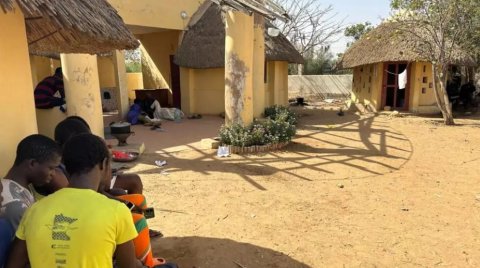Migrants Face Dire Conditions at Senegal-Mauritania Border Crisis
The situation at the Senegal-Mauritania border has reached a critical point, with hundreds of migrants stranded under dire conditions. Many are fleeing economic hardship and conflict in their home countries, only to find themselves in a precarious state of existence at the border. This crisis highlights the urgent need for comprehensive solutions to address the challenges faced by migrants in this region.
The Context of the Crisis
The border between Senegal and Mauritania has become a hotspot for migration in recent years. Many individuals, primarily from sub-Saharan Africa, embark on perilous journeys in search of better opportunities. However, the route through this area has become increasingly dangerous, with many migrants facing significant risks.
- Economic Hardship: Many migrants are driven by poverty and the lack of viable economic opportunities in their home countries, prompting them to seek a better life abroad.
- Political Instability: Conflicts and political unrest in several African nations have forced individuals to flee, seeking safety and stability.
- Human Rights Violations: Migrants often encounter abuse and exploitation during their journeys, making their plight even more challenging.
Current Situation at the Border
At the Senegal-Mauritania border, the conditions for migrants are alarming. Reports indicate that many individuals are living in makeshift camps, lacking access to basic necessities such as food, clean water, and medical care. The dire state of affairs is exacerbated by harsh weather conditions, making survival even more difficult.
- Overcrowding: The camps are severely overcrowded, leading to unsanitary conditions that increase the risk of disease.
- Limited Resources: Humanitarian organizations are struggling to provide adequate support, with limited resources available to assist the large number of individuals in need.
- Healthcare Access: Many migrants are unable to access medical care, leaving them vulnerable to health issues.
The Role of Humanitarian Organizations
Humanitarian organizations are working tirelessly to alleviate the suffering of migrants at the border. They are providing essential services such as food distribution, medical assistance, and psychosocial support. However, the scale of the crisis often outpaces their efforts, highlighting the need for greater international support and collaboration.
- Food and Water Distribution: Organizations are distributing food and clean water to help sustain those living in the camps.
- Medical Assistance: Medical teams are providing care for individuals suffering from acute illnesses and injuries.
- Psycho-social Support: Mental health support is critical as many migrants face trauma from their journeys.
Government Response and Policy Gaps
The response from governments in the region has been mixed. While some efforts have been made to address the crisis, many migrants feel abandoned by local authorities. Additionally, policy gaps often hinder effective responses, leaving many individuals in prolonged states of uncertainty.
- Border Control Measures: Increased border control measures have made it more difficult for migrants to cross, leading to a backlog and overcrowding at the border.
- Lack of Legal Pathways: There is a significant absence of legal migration pathways, forcing individuals to resort to dangerous and illegal means to cross borders.
- Need for Policy Reform: Comprehensive policy reform is necessary to create a more humane and effective migration system.
International Community’s Responsibility
The international community plays a crucial role in addressing this crisis. It is imperative for countries to come together to develop coordinated strategies that prioritize the safety and dignity of migrants. This includes:
- Creating Safe Migration Pathways: Developing legal migration channels can help reduce the number of individuals resorting to dangerous routes.
- Enhancing Humanitarian Aid: Increased funding and resources for humanitarian organizations can help meet the urgent needs of migrants.
- Strengthening Regional Cooperation: Collaborative efforts between countries can lead to more effective management of migration issues.
Conclusion
The dire conditions faced by migrants at the Senegal-Mauritania border are a stark reminder of the broader challenges within the global migration system. As individuals continue to flee their homes in search of safety and opportunity, it is crucial for governments, humanitarian organizations, and the international community to come together to provide the necessary support and create sustainable solutions. Only through collective efforts can we hope to address the root causes of migration and improve the lives of those who are most vulnerable.
In light of this ongoing crisis, raising awareness and advocating for the rights of migrants is essential. As we reflect on the struggles faced by those at the Senegal-Mauritania border, let us commit to taking action to support those in need and work towards a more just and humane migration system.










